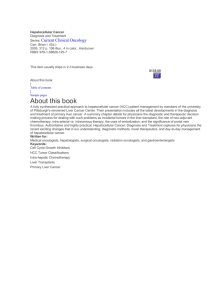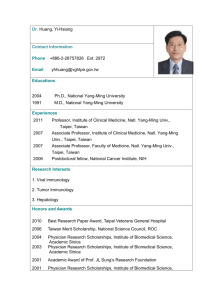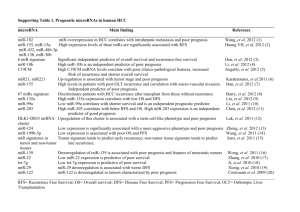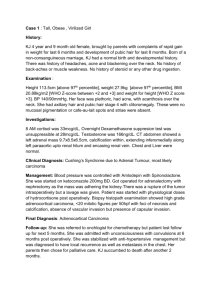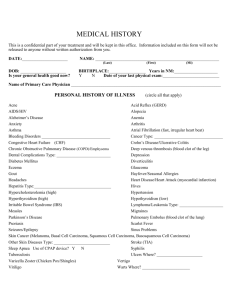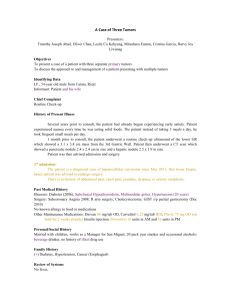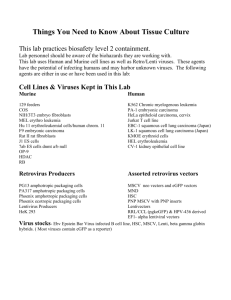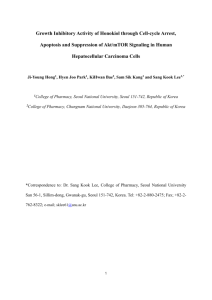hep22364-Supplementaryinformation2
advertisement
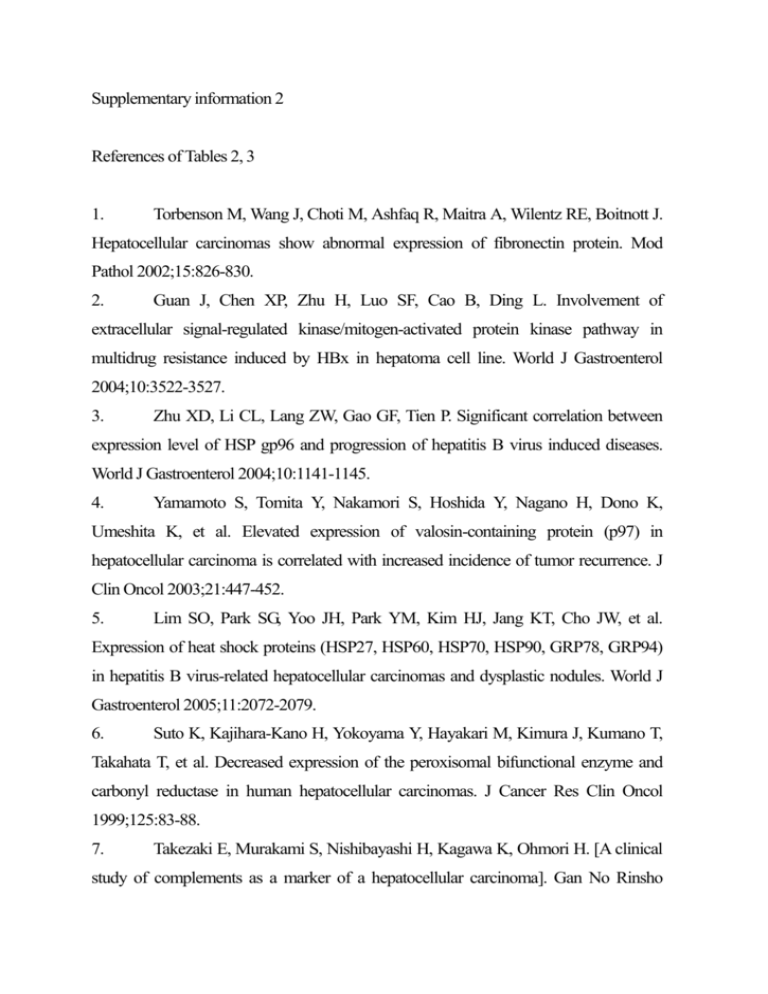
Supplementary information 2 References of Tables 2, 3 1. Torbenson M, Wang J, Choti M, Ashfaq R, Maitra A, Wilentz RE, Boitnott J. Hepatocellular carcinomas show abnormal expression of fibronectin protein. Mod Pathol 2002;15:826-830. 2. Guan J, Chen XP, Zhu H, Luo SF, Cao B, Ding L. Involvement of extracellular signal-regulated kinase/mitogen-activated protein kinase pathway in multidrug resistance induced by HBx in hepatoma cell line. World J Gastroenterol 2004;10:3522-3527. 3. Zhu XD, Li CL, Lang ZW, Gao GF, Tien P. Significant correlation between expression level of HSP gp96 and progression of hepatitis B virus induced diseases. World J Gastroenterol 2004;10:1141-1145. 4. Yamamoto S, Tomita Y, Nakamori S, Hoshida Y, Nagano H, Dono K, Umeshita K, et al. Elevated expression of valosin-containing protein (p97) in hepatocellular carcinoma is correlated with increased incidence of tumor recurrence. J Clin Oncol 2003;21:447-452. 5. Lim SO, Park SG, Yoo JH, Park YM, Kim HJ, Jang KT, Cho JW, et al. Expression of heat shock proteins (HSP27, HSP60, HSP70, HSP90, GRP78, GRP94) in hepatitis B virus-related hepatocellular carcinomas and dysplastic nodules. World J Gastroenterol 2005;11:2072-2079. 6. Suto K, Kajihara-Kano H, Yokoyama Y, Hayakari M, Kimura J, Kumano T, Takahata T, et al. Decreased expression of the peroxisomal bifunctional enzyme and carbonyl reductase in human hepatocellular carcinomas. J Cancer Res Clin Oncol 1999;125:83-88. 7. Takezaki E, Murakami S, Nishibayashi H, Kagawa K, Ohmori H. [A clinical study of complements as a marker of a hepatocellular carcinoma]. Gan No Rinsho 1990;36:2119-2122. 8. Heinrich PC, Morris HP, Weber G. Behavior of transaldolase (EC 2.2.1.2) and transketolase (EC 2.2.1.1) Activities in normal, neoplastic, differentiating, and regenerating liver. Cancer Res 1976;36:3189-3197. 9. Iguchi K, Murakami S, Matsumoto A, Shimizu A, Sakuragawa N. Abnormally high level of antithrombin in a case with hepatocellular carcinoma. Thromb Res 1996;84:137-141. 10. Yoon GS, Lee H, Jung Y, Yu E, Moon HB, Song K, Lee I. Nuclear matrix of calreticulin in hepatocellular carcinoma. Cancer Res 2000;60:1117-1120. 11. Narasaka T, Moriya T, Endoh M, Suzuki T, Shizawa S, Mizokami Y, Matsuoka T, et al. 17Beta-hydroxysteroid dehydrogenase type 2 and dehydroepiandrosterone sulfotransferase in the human liver. Endocr J 2000;47:697-705. 12. Yang MD, Wu CC, Chiou SH, Chiu CF, Lin TY, Chiang IP, Chow KC. Reduction of dihydrodiol dehydrogenase expression in resected hepatocellular carcinoma. Oncol Rep 2003;10:271-276. 13. Kawai M, Hosaki S. Clinical usefulness of malate dehydrogenase and its mitochondrial isoenzyme in comparison with aspartate aminotransferase and its mitochondrial isoenzyme in sera of patients with liver disease. Clin Biochem 1990;23:327-334. 14. Hammond KD, Balinsky D. Activities of key gluconeogenic enzymes and glycogen synthase in rat and human livers, hepatomas, and hepatoma cell cultures. Cancer Res 1978;38:1317-1322. 15. Bellisola G, Casaril M, Gabrielli GB, Caraffi M, Corrocher R. Catalase activity in human hepatocellular carcinoma (HCC). Clin Biochem 1987;20:415-417. 16. Park KS, Cho SY, Kim H, Paik YK. Proteomic alterations of the variants of human aldehyde dehydrogenase isozymes correlate with hepatocellular carcinoma. Int J Cancer 2002;97:261-265. 17. Athanassiadou P, Psyhoyiou H, Grapsa D, Gonidi M, Ketikoglou I, Patsouris E. Cytokeratin 8 and 18 expression in imprint smears of chronic viral hepatitis, autoimmune hepatitis and hepatocellular carcinoma. A preliminary study. Acta Cytol 2007;51:61-65. 18. Dillon BJ, Prieto VG, Curley SA, Ensor CM, Holtsberg FW, Bomalaski JS, Clark MA. Incidence and distribution of argininosuccinate synthetase deficiency in human cancers: a method for identifying cancers sensitive to arginine deprivation. Cancer 2004;100:826-833. 19. Kim SZ, Kupke KG, Ierardi-Curto L, Holme E, Greter J, Tanguay RM, Poudrier J, et al. Hepatocellular carcinoma despite long-term survival in chronic tyrosinaemia I. J Inherit Metab Dis 2000;23:791-804. 20. Chen G, Wang H, Miller CT, Thomas DG, Gharib TG, Misek DE, Giordano TJ, et al. Reduced selenium-binding protein 1 expression is associated with poor outcome in lung adenocarcinomas. J Pathol 2004;202:321-329. 21. Tan L, Fu XY, Liu SQ, Li HH, Hong Y, Wu MC, Wang HY. Expression of p28GANK and its correlation with RB in human hepatocellular carcinoma. Liver Int 2005;25:667-676.
